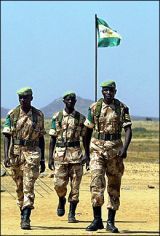INTERVIEW-AU keen to double Darfur force, says Rwanda
By Jason Szep
SINGAPORE, March 18 (Reuters) – The African Union is seeking to double its forces in Darfur to about 6,000 troops, a number that could stabilise Sudan’s troubled western region, Rwanda’s foreign minister said on Friday.

|
|
Rwandan troops operating under the Africa Union mandate walk inside the AU base in Kab Kabiya, Sudan. (AFP). |
With security rapidly deteriorating, the commander of AU troops in Darfur has told Rwandan officials that a 6,000-strong force would be able to secure all major refugee camps and roads, Rwanda’s Foreign Minister Charles Murigande said.
“They have asked us if we are willing to increase our participation and we have promised that we are willing. We are willing to give more troops to southern Darfur,” Murigande told Reuters in an interview during a visit to Singapore.
He said Rwanda had 392 soldiers in Darfur, but declined to say how many additional men it would send.
Tens of thousands have been killed in the Darfur rebellion which erupted in February 2003 following years of tribal conflict over scarce resources.
Thousands are dying every month in squalid camps which house almost 2 million people who have fled their homes in the vast arid region.
The Nigerian commander of the AU’s force in Darfur, Festus Okonkwo, told Rwandan President Paul Kagame that 6,000 troops would be enough to “bring the level of violence to probably what would be acceptable”, Murigande said.
“He is talking from experience because where you have the AU force deployed, violence has stopped. Where you still have violence is in areas where you do not have AU forces,” he said.
COLLAPSED TALKS
Darfur’s rebels accuse Khartoum of neglect and giving preferential treatment to Arab tribes.
The United Nations says Khartoum armed militiamen known as the Janjaweed to fight the rebels, a charge the government denies. The Janjaweed are accused of widespread rape, looting, killing and burning in non-Arab villages.
AU envoy Baba Gana Kingibe completed a week-long mission to the region on Thursday with a warning that unless the warring parties returned to the negotiating table soon, the situation would only get worse.
Several rounds of talks collapsed last year in the Nigerian capital Abuja. Murigande said stability in Darfur could be the catalyst for the talks.
“Although we have political negotiations with the rebels and the government, whenever there are incidents of violence, that has direct repercussions on the negotiations. Controlling violence would have a positive impact on the negotiations,” he said.
Separately, Murigande cautiously welcomed news that U.N. officials have given militia fighters in the lawless east of the Democratic Republic of Congo two weeks to give up their guns voluntarily, but he criticised the U.N.’s record in suppressing the brutal militias.
“Of late they are talking tough. Let’s hope they are going to change,” he said. “So far the U.N.’s performance in Ituri has been extremely poor.” Ethnic warfare has killed more than 50,000 people in Ituri since 1999.
